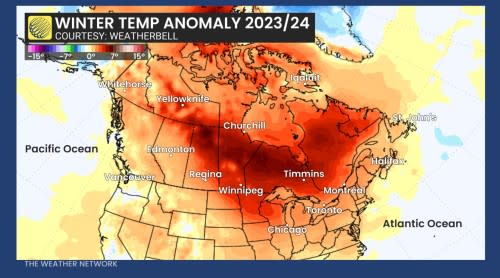Canada experienced an exceptionally warm winter last year, with record-breaking temperatures across the country. This was largely attributed to a strong El Niño event in the tropical Pacific. However, this year, ocean water temperatures are cooler, indicating a developing La Niña event, which has the opposite effect on Canadian winters. While La Niña winters are more variable in their impact, historical data suggests that they often start off strong in December, with colder than normal temperatures persisting through the season.
Although it is unlikely that this winter will be as warm as last year, there are still uncertainties regarding how the season will progress. In past weak La Niña events, winter typically started cold but then transitioned to milder conditions as the season went on, particularly in central and eastern Canada. However, the specific location of the coolest ocean water associated with La Niña can influence whether Canada experiences normal or colder than normal temperatures throughout the winter.
As meteorologists finalize their official winter forecast for 2024-25, they are monitoring the development of La Niña to determine whether it will lean towards a central Pacific-based event or an eastern Pacific-based event. The current evidence suggests that it may be a hybrid event, with alternating periods resembling both scenarios. While some regions may see a repeat of last winter’s mild conditions, it is unlikely that Canada as a whole will experience another record-breaking warm winter.
With winter likely to show up in December, ski areas across Canada can anticipate more wintry conditions leading up to Christmas and New Years. While it is too early to predict a white Christmas, the colder start to this winter may be a welcome change from recent trends. However, as the season progresses into January and February, there may be a shift towards milder temperatures, particularly in central and eastern Canada, with western Canada potentially experiencing colder than normal conditions.
Overall, while this winter may not reach the extremes of last year, there is still uncertainty regarding how the season will unfold. The influence of La Niña on Canadian winters is complex and variable, with multiple factors at play. Meteorologists will continue to monitor ocean temperatures and other indicators to refine their winter forecast, with the official announcement set for November 27th. As the season approaches, Canadians can expect a mix of wintry conditions throughout the winter, with some regions experiencing colder temperatures while others may see milder weather.


